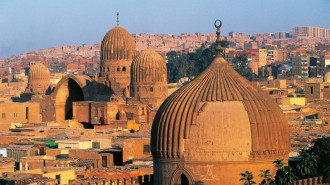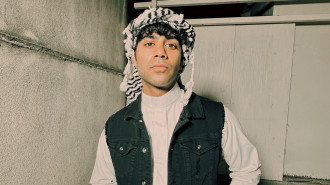
Egyptian working class and Sudanese migrants exploited by Cairo's bullish rent market

A few days are left before Gamal al-Sayem has to move out of his flat in Faisal, a sprawling lower-middle-class neighbourhood in Giza, part of the Greater Cairo region. He will now have to find new lodgings.
Gamel, a house painter and a father of three, received a notice from his landlord a few days ago where he was told he would have to terminate his tenancy at the end of August.
"The landlord wants to lease the flat to Sudanese tenants," Gamel, in his mid-forties, told The New Arab. "He will charge them three times as much as I pay."
"The war has brought huge benefits to property owners in Egypt who have cashed in on the arrival of tens of thousands of refugees from Sudan"
The war in Sudan has worsened Egypt's economic problems, caused it to lose an important partner in its struggle to protect its rights to the water of the Nile River, and heightened security risks on its shared border with Sudan.
Nevertheless, the war has brought huge benefits to property owners in Egypt who have cashed in on the arrival of tens of thousands of refugees from Sudan.
Around 200,000 Sudanese nationals have arrived in Egypt since the war broke out in mid-April between the Sudanese army and the paramilitary Rapid Support Forces. This number keeps rising.
Most of the Sudanese nationals arriving are moneyed ones who found a way around the challenges they faced to escape the war back home and reach the Egyptian border. When they arrive, they increase demand for housing and most landlords are taking the chance to swell their profits.
"Landlords have benefited greatly from the arrival of the Sudanese refugees, which have raised both demand and price of real estate properties dramatically," real estate broker Alaa Gaber told The New Arab.
|
Predatory prices
Increased demand normally leads to an increase in prices, but tenants like Gamel describe the current situation as "greedy." "The landlord wants to double or even triple the rent, but people like me cannot pay such a high amount of money every month," he said.
Gamel pays 2,000 (roughly $64) for rent, which is quite high for an irregular worker like him. Gamel now searches for alternative housing in the same neighbourhood.
However, rents have already risen sharply, a natural outcome of the arrival of the Sudanese refugees has produced.
This is not happening in this neighbourhood only, but everywhere else in Egypt where property owners are exaggerating rents, in their bid to do well out of the presence of people from the war-torn neighbouring country, who are desperate for housing. "My landlord has just told me that she would not renew my rental agreement when it expires at the end of this year," Asmaa Mubarak, an atelier owner who designs and sells female dresses, told The New Arab.
"She says the flat can bring her more money, seeing property owners in the same district receiving high rents from the Sudanese," she added.
Mubarak, in her early fifties, used to pay $3,000 (about $100) in rent for her atelier which is located in close proximity to the Giza Plateau.
Burden
The hundreds of thousands of Sudanese refugees who have arrived here add to the around 9 million refugees and asylum-seekers that are already in the country.
Only 300,000 of all these refugees and asylum-seekers are registered with the United Nations High Commissioner for Refugees (UNHCR).
These 9 million refugees (around 8.7% of the Egyptian population) include 4 million Sudanese; 1.5 Syrians; 1 million Libyans, and 1 million Yemenis, the UNHCR says.
Egypt is unique in that it does not set up camps for the refugees, but allows them to live within its cities and receive the same services offered to Egyptian citizens. In Egyptian cities, these 9 million refugees share everything with Egyptians: their transport, their schools and their hospitals, adding to high pressure on these facilities.
However, with Egypt's growing economic problems, partly induced by the current war in Ukraine, the refugees are proving a heavy load day after day. The Egyptian prime minister, attending a conference on refugees in Rome, Italy, on July 23, said his country does not receive international support commensurate with the refugee burden it shoulders.
"The hundreds of thousands of Sudanese refugees who have arrived here add to the around 9 million refugees and asylum-seekers that are already in the country"
Profit
Some Egyptians are, however, turning this homeless to their own advantage, especially property owners.
Tamer al-Maghrabi, the owner of a residential building in the western Cairo neighbourhood of Nasr City, is one of them.
Tamer used to offer most of the apartments in his building as furnished for rent.
When he learned of the profits other owners amassed by leasing their properties to the refugees, he stopped leasing the apartments to Egyptians and accepted Sudanese tenants only.
"The Sudanese are ready to pay two or even three times as much as Egyptians pay, depending on the size of the apartment and the quality of its finishing and furniture," Tamer told The New Arab. "I see nothing wrong with making the most out of my property," he added.
|
Nevertheless, this trend threatens to turn a large number of people homeless, with most of those complaining about the desire of their landlords to kick them out having parol, not written, contracts.
Furnished flat owners are using this development to the full. Tamer has raised the rent of his flats to 30,000 Egyptian pounds (around $970) each month, from 11,000 pounds (about $350) a month, which will help him make a fortune if the war in Sudan keeps dragging on.
"The war in Sudan has increased demand in the Egyptian real estate market," Ayman al-Gendi, another flat owner, told the New Arab.
He said he used to lease his furnished flat in Faisal for 4,000 pounds (roughly $129) a month but has now raised the rent to 16,000 pounds ($516) a month.
Breeding ground
Egypt is proving to be a rich soil for the business success of refugee communities.
Refugees arriving in the country, especially the Syrians, have established their own successful business models, with some of Egypt's residential areas turning into Syrian business colonies. The Sudanese are trying to use this environment to their favour by launching their own small projects, including restaurants, cafés and bakeries.
For the most part, these outlets cater to the needs of the growing Sudanese community, owners say. "We also try to widen the scope of our clientele by serving Egyptian cuisine," Dalal Tageddine, the owner of the Sudanese restaurant, Zoal, in Nasr City, told The New Arab. "I am sure Egyptians will like the Sudanese cuisine if they try it," she added.
Gamel, the house painter, looks at all this and grits his teeth in anger. "These people are throwing us out of our homes," he said. "They will apparently take over the market and our jobs.
Amr Emam is a Cairo-based journalist. He has contributed to the New York Times, San Francisco Chronicle and the UN news site IRIN
Follow him on Twitter: @dreamyworld33




 Follow the Middle East's top stories in English at The New Arab on Google News
Follow the Middle East's top stories in English at The New Arab on Google News


